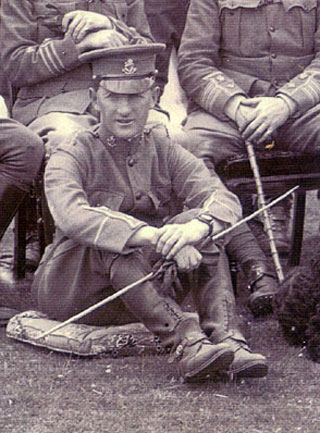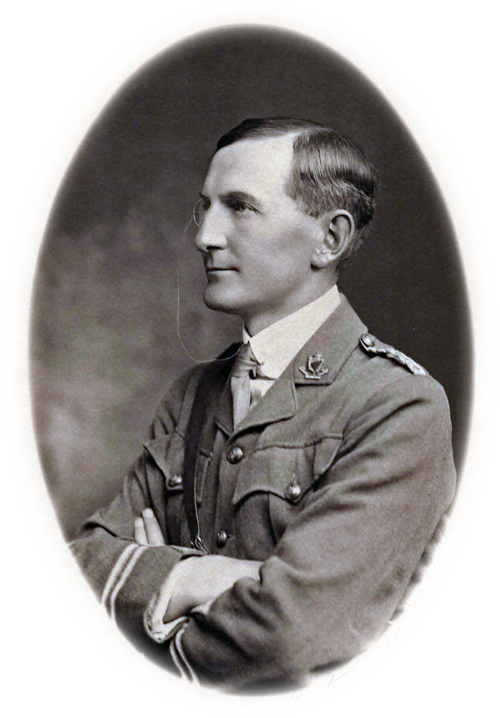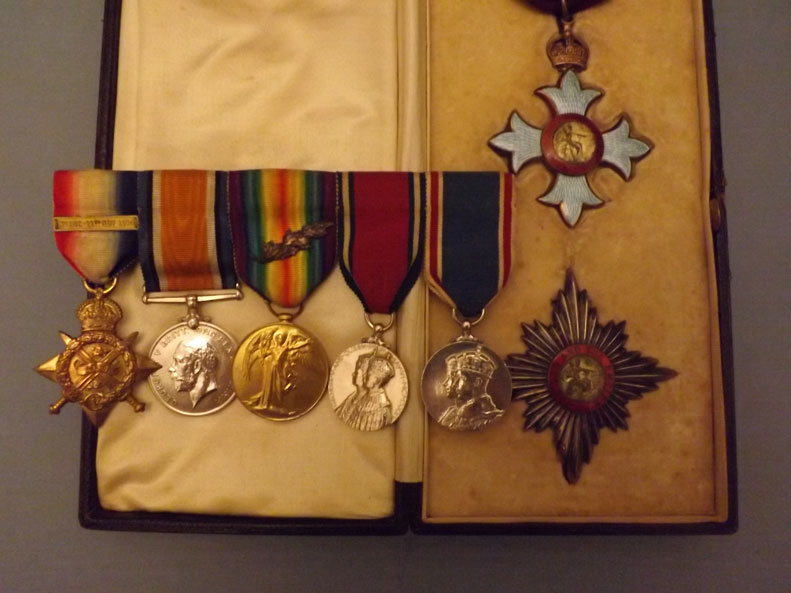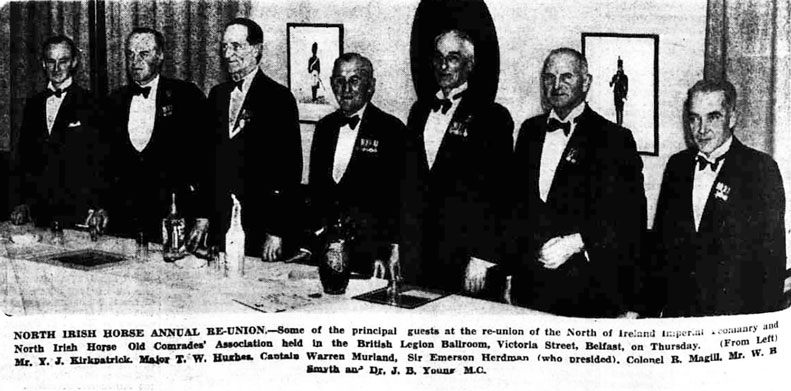Major Emerson Crawford Herdman

Emerson Crawford Herdman, a prominent mill-owner of Carricklea, near Strabane, Co. Tyrone, was born on 2 January 1869, son of John Herdman and Mary Elizabeth Marion Herdman (nee Gosselin). He studied at Uppingham School and at Oxford. Commissioned in the 5th Battalion, Royal Inniskilling Fusiliers, he became a lieutenant on 21 September 1889. He resigned his commission on 18 April 1894.
On 17 July 1903 he was commissioned as a lieutenant in the North of Ireland Imperial Yeomanry, transferring to the newly-formed North Irish Horse five years later. He was promoted to captain on 21 April 1913 and major on 11 February 1915.
Herdman also commanded the 1st Tyrone Battalion of the UVF.
Captain Herdman embarked for France with A Squadron on 17 August 1914. During the retreat from Mons the squadron was split, with two troops under Herdman acting as escort to the commander-in-chief General French. A letter written home by North Irish Horseman William Morton refers to Herdman's experiences at this time:
... the other two troops ... [had] some exciting experiences in the retreat. I believe they were nearly captured at St. Quentin by holding a position too long, but Captain Herdman, with two other officers and Sergeant-Major Burns, outwitted the enemy and got clear in the nick of time. They retreated about 20 miles, but the enemy was again on their track. I heard they nearly lost their transport by a horse giving up, but succeeded in gaining a bridge in time just before it was blown up by the Engineers. The squadron had been all together since we started to advance.
In the early months of the war a number of Herdman’s letters home were published in the Irish press (below).
WITH THE NORTH IRISH HORSE.
Letters from Captain E. C. Herdman.
THE DIFFICULTIES OF UHLAN HUNTINGSeveral interesting letters have been received by Mrs. E. C. Herdman, Carricklee, County Tyrone, from her husband, Mr. E. C. Herdman, D.L., Captain of the North Irish Horse, which are with the Headquarters Staff at the front.
In a letter dated 12th September Captain Herdman, speaks of the difficulties of getting any variety of food and of the heavy rains, which rendered marching difficult. He mentions that they are in a tiny place about the size of Strabane, and that motors bringing supplies to the front were coming through it night and day. He adds- “For the last forty-eight hours there has been constant cannonading ten miles north. The Germans have got a strong position there – the last, they say, they can take in France. Our guns never cease. It is hard to believe they are slaughtering each other so close. We have got comfortable billets here, but we had not much time to enjoy them, as after dinner we got an order to go out this morning early in search of Uhlans who had been cut off and were hiding in the woods. We got up at 2.30 o’clock, and left at four. After searching the woods all day I got back at five. We were sent the wrong way, and only heard at 2.30 p.m. where the Uhlans were. We arrived at the place about three, and then found that the Highlanders had taken them all. There were about sixty of them, a great proportion being officers. They were quite glad to surrender to the British, but would not to the French. They were all starving. Two hundred German prisoners came in here last night. They were absolutely ravenous, and our soldiers had to separate them with the butt-ends of their rifles or they would have fought each other for their food. They are full of French money, as they have been robbing everywhere, and they have done a great lot of damage to this town. They were here for eight days. They give our Tommies five francs for a tin of bully beef, and a franc for a cigarette. There is absolutely no tobacco left. A countryman told me to-day that a German officer and his orderly were in the place ten minutes before we arrived. They were asking for bread, as all they had been living on was the beetroot from the fields. I do hope this is true. Ross (son of Lord Justice Ross) has gone out this evening on a motor lorry with some of our men to bring in about thirty German horses in the woods. One of the German officers went with them to show them where they were. Our ‘gees’ had a bad time to-day, as we had no oats for them, so we fed them on the corn stooks in the field. We had quite a ‘bend’ to-night – bacon, boiled eggs, with potatoes and butter, and two bottles of ‘fiz,’ which Cole (Lord) had bought. We found about six German motor lorries abandoned yesterday (which is a good sign), and also another huge one with a trailer, which our A.S.C. officer, with a beaming countenance, was driving at about two miles an hour. Last week we were fighting multitudes of Germans unaided, the greater part of the French army being in Alsace. I do hope the Duke’s mission for the North Irish Horse will be successful.”
In another letter, dated 15th September, Captain Herdman states – “There is still a tremendous battle going on just north of here, and I believe we are a bit more than holding our own, while the centre is giving away before the French. The German right, which we are attacking, are in an exceedingly strong position, and they are holding on like grim death. Cannonading has never ceased since we came here on Saturday. We are, I believe, over the river endeavouring to get round. As I write there is a constant stream of waggons and motors passing along to the front. I took the squadron out to exercise this morning, but had hardly got there when I received an order to come back at once and go Uhlan-hunting. But we might just as well look for a needle in a bundle of straw. They are in enormous woods, which it would take a brigade of cavalry to search. We spent all day interviewing villagers and searching deserted farm-houses. What a mess the Germans have made of them – nearly everything smashed, and furniture, cupboards, and bedding scattered all over the houses! In one village the streets were covered with broken and bent German lances and all sorts of their stuff. The French cavalry had attacked them there and routed them. We could see the shells bursting in the air about four miles away and the whole horizon black with smoke.”
On the 16th inst. Captain Herdman wrote – “The firing has practically ceased to-day, and we have not heard any news except that the Germans are out of Rheims. Luckily they have not damaged the cathedral. The South are out Uhlan-hunting to-day. An officer who was captured on Sunday says the son of a German Chancellor is somewhere about these woods as he left him a few days ago.”
(Belfast News-Letter, 28 September 1914)
WITH THE NORTH IRISH HORSE.
Letters from Captain E. C. Herdman.
Acknowledging the receipt of cigarettes, tobacco and pipes, and matches from the workers in the handkerchief department of the York Street Flax Spinning Company, Ltd., Captain E. C. Herdman, of the North Irish Horse, writes – “I need not tell you how much the men will appreciate same. At the start of the show when we were constantly on the move, and had a lot of work to do with very little to eat, the whole cry of the men when writing home was for cigarettes and something to smoke. Now when they are being supplied with these luxuries by kind friends at home, they are perfectly happy and contented … With smokes, good food, and warm clothes, they are ready to stay in the trenches as long as you like and take on the Germans all day.”
Captain Herdman adds that they have had bitter cold weather, and after a few days snow there were three days’ hard frost. In a further letter thanking the kindly donors for an acceptable present of matches, he says nothing more is wanted. Even in the towns that have not been visited by the Germans the supply only lasts about two days, and where the enemy have been there are no matches at all.
Referring to the conditions, he states – “The men are wonderfully well off now, well fed, and – thanks to kind friends at home – lots of warm things to wear and cigarettes to smoke. Owing to the awful weather we have been having lately their hardships have been terrible; but it has not affected their spirits in the least degree, and their health is, on the whole, excellent.
“I hear the spinning mills in Lille have suffered very much. Last week one of our troops were quartered in a mill in Armentieres and another one in Estaires. The tow store made an excellent place to sleep in. Fancy that happening in Ireland!”
(Belfast News-Letter, 28 November 1914)
Herdman returned home on leave in May 1915. He joined the reserve regiment at Antrim the following November, taking command of B Squadron the following year.
In May 1917 a medical board found him unfit for general service but fit for garrison duty abroad or home service, due to defective vision. He saw no further overseas service. On 25 January 1919 he was demobilized and on 16 November the following year relinquished his commission.
From 1920 to 1922 Herdman served as Lord Lieutenant of Donegal. He was elected as a member of the Senate of Northern Ireland in 1923 and served until his death on 10 February 1949.



Major Herdman, centre, Belfast News-Letter 12 November 1938
Image 1 shows Herdman with officers of the North of Ireland Imperial Yeomanry in 1905. Image 3, Herdman's medals, kindly provided by William Gordon.
